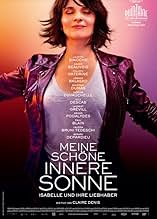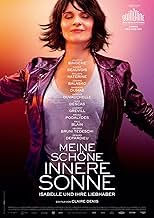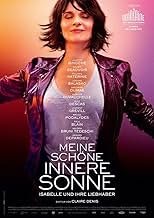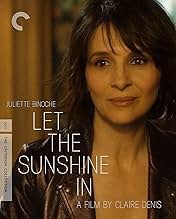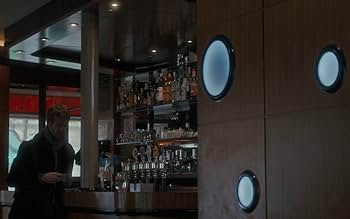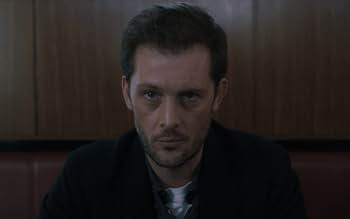ÉVALUATION IMDb
6,0/10
8,2 k
MA NOTE
Isabelle, divorcée, un enfant, cherche un amour. Enfin un vrai amour.Isabelle, divorcée, un enfant, cherche un amour. Enfin un vrai amour.Isabelle, divorcée, un enfant, cherche un amour. Enfin un vrai amour.
- Director
- Writers
- Stars
- Prix
- 2 victoires et 13 nominations au total
Avis en vedette
I don't think the people giving this a 1/10 went into this with realistic expectations. This is French cinema, it's going to be sad and harsh and difficult and the character likely won't come to a concrete and obvious realization leading to her happiness. This movie does not hold your hand, but it is well worth it for those willing to look deeper into their emotional history to see what it is reaching for. There are some conversations that don't land but a lot do because Juliette Binoche gives a stellar performance. This is the type of character study that most actresses wait their whole life to do, she's a volcano of emotions bubbling under the surface for the whole runtime. Her character is probably a "bad person". She dates several married men, but that does not invalidate her problems. This movie is about the idea that chasing perfection can often lead you down the wrong path in your relationships and lead to a fear of commitment. For anyone who finds it difficult to be swept off your feet and easily believe in the rest of your life with someone, this is the movie for you. If you think the title of the film is a task that is easy to achieve, maybe it isn't.
I hadn't seen a preview or even read a precis before going, but I generally like French movies, so I went. I didn't know what to make of it -- at the beginning I thought it was a drama, but then the scenes got absurdly exaggerated, and I decided it must be a comedy that the language barrier kept me from finding funny. So I was surprised to learn from the reviews here that it was not a comedy! I still don't know what to make of it. So, my advice is, if you have to pay money to see this and you don't speak fluent French, don't bother (in my case, I have a theater membership that allows me pretty much unlimited movies, so I do tend to take chances).
... in its focus on unsatisfactory relationships - and it even has Depardieu in a pointless cameo role!
At one level, it's not too surprising that a well-regarded female artist of a certain age would have trouble finding a suitable partner following her divorce. However, her inability does seem at least somewhat self-inflicted, as she keeps latching on to married and otherwise unavailable men - some of whom are clearly complete arseholes. Indeed, there were so many of these I lost track of who was supposed to be "just a friend" and who was her current lover, and what might happen in her future.
Worth a look, but not Binoche's best, IMHO.
At one level, it's not too surprising that a well-regarded female artist of a certain age would have trouble finding a suitable partner following her divorce. However, her inability does seem at least somewhat self-inflicted, as she keeps latching on to married and otherwise unavailable men - some of whom are clearly complete arseholes. Indeed, there were so many of these I lost track of who was supposed to be "just a friend" and who was her current lover, and what might happen in her future.
Worth a look, but not Binoche's best, IMHO.
"You don't have to go looking for love when it's where you come from" - Werner Erhard
Isabelle (Juliet Binoche, "Ghost in the Shell"), a divorced fiftyish artist, is attractive, urbane, and highly intelligent but her relationships seem to have a built-in mechanism for self destruction. The men in Isabelle's life offer her little except temporary physical pleasure and are pretty much ciphers (and not very nice ones at that). Loosely based on Roland Barthes' book "A Lover's Discourse: Fragments" with a screenplay by Christine Angot, Claire Denis' sophisticated comedy/drama Let the Sunshine In (Un beau soleil intérieur) is lighter fare than normal for Denis, but it has its probing, self-reflective moments and Juliet Binoche, as usual, is an appealing screen presence.
Like many of us, Isabelle wants to find someone who fits her pictures but, as most of us discover sooner or later, life often does not fit our pictures. All of Isabelle's relationships start out to be very promising but eventually the decisions she makes about her partners seem to get in the way of her satisfaction. Whatever she thinks that she is looking for, she does not find it with either banker Vincent (Xavier Beauvois, "Django"), actor (Nicolas Duvauchelle, "Wedding Unplanned"), ex-husband Francois (Laurent Gréville, "A Perfect Man"), or any other potential beau for that matter. The film begins with Isabelle in bed with the married, pretentious Vincent. Things are looking a-ok until she decides that he is taking too long to climax, a fact she decides reflects badly on her.
Vincent asks her whether she has had more success with other lovers, but her response is a convincing slap in the face. She is with him when he bullies a bartender but she does not react. The next time he visits her in her apartment, however, she calls him an unrepeatable name, then tells him to leave and not come back. Instead, she hooks up with a young actor (Duvauchelle), also married, though with a better disposition. When she invites him in for a drink, they play endless games about whether he should stay or leave. When he decides to stay, they go through the motions together but by the next morning he concludes that things were better before they had sex and wishes that it had not happened.
The next one up is François (Gréville), Isabelle's ex-husband, who is concerned about their ten-year-old daughter after she tells him that her mother cries every night. This is not good news for her to hear and she uses it as a reason to end any chance for reconciliation. There are several more suitors that follow but Isabelle always finds something about them that she dislikes. She meets Sylvain (Paul Blain, "All is Forgiven") at a club who literally carries her away with pleasure as they dance to Etta James' beautiful "At Last." Unfortunately, Fabrice (Bruno Podalydès, "Chocolat"), an art gallery owner, convinces her that Sylvain is wrong for her because he is not a good fit for her circle. This provides cover for her to end yet another relationship, one that had barely even begun. There is not much left for her of course but to go to a clairvoyant (Gerard Depardieu, "You Only Live Once"), but his banter provides little certainty that she will find "the one." There are times in Let the Sunshine In when Isabelle has moments of happiness and optimism, but she can also come across as needy and, at times, almost desperate. Through the magic of Binoche's performance, Isabelle is a sympathetic figure and one that we root for. Her quest, however, has a touch of game playing to it and it seems that, for Isabelle, it may not be whether you win or lose but how you play the game.
Isabelle (Juliet Binoche, "Ghost in the Shell"), a divorced fiftyish artist, is attractive, urbane, and highly intelligent but her relationships seem to have a built-in mechanism for self destruction. The men in Isabelle's life offer her little except temporary physical pleasure and are pretty much ciphers (and not very nice ones at that). Loosely based on Roland Barthes' book "A Lover's Discourse: Fragments" with a screenplay by Christine Angot, Claire Denis' sophisticated comedy/drama Let the Sunshine In (Un beau soleil intérieur) is lighter fare than normal for Denis, but it has its probing, self-reflective moments and Juliet Binoche, as usual, is an appealing screen presence.
Like many of us, Isabelle wants to find someone who fits her pictures but, as most of us discover sooner or later, life often does not fit our pictures. All of Isabelle's relationships start out to be very promising but eventually the decisions she makes about her partners seem to get in the way of her satisfaction. Whatever she thinks that she is looking for, she does not find it with either banker Vincent (Xavier Beauvois, "Django"), actor (Nicolas Duvauchelle, "Wedding Unplanned"), ex-husband Francois (Laurent Gréville, "A Perfect Man"), or any other potential beau for that matter. The film begins with Isabelle in bed with the married, pretentious Vincent. Things are looking a-ok until she decides that he is taking too long to climax, a fact she decides reflects badly on her.
Vincent asks her whether she has had more success with other lovers, but her response is a convincing slap in the face. She is with him when he bullies a bartender but she does not react. The next time he visits her in her apartment, however, she calls him an unrepeatable name, then tells him to leave and not come back. Instead, she hooks up with a young actor (Duvauchelle), also married, though with a better disposition. When she invites him in for a drink, they play endless games about whether he should stay or leave. When he decides to stay, they go through the motions together but by the next morning he concludes that things were better before they had sex and wishes that it had not happened.
The next one up is François (Gréville), Isabelle's ex-husband, who is concerned about their ten-year-old daughter after she tells him that her mother cries every night. This is not good news for her to hear and she uses it as a reason to end any chance for reconciliation. There are several more suitors that follow but Isabelle always finds something about them that she dislikes. She meets Sylvain (Paul Blain, "All is Forgiven") at a club who literally carries her away with pleasure as they dance to Etta James' beautiful "At Last." Unfortunately, Fabrice (Bruno Podalydès, "Chocolat"), an art gallery owner, convinces her that Sylvain is wrong for her because he is not a good fit for her circle. This provides cover for her to end yet another relationship, one that had barely even begun. There is not much left for her of course but to go to a clairvoyant (Gerard Depardieu, "You Only Live Once"), but his banter provides little certainty that she will find "the one." There are times in Let the Sunshine In when Isabelle has moments of happiness and optimism, but she can also come across as needy and, at times, almost desperate. Through the magic of Binoche's performance, Isabelle is a sympathetic figure and one that we root for. Her quest, however, has a touch of game playing to it and it seems that, for Isabelle, it may not be whether you win or lose but how you play the game.
The tension between wanting something from someone and the fact that it must be given freely and not asked for is at the heart of this film with its typically brilliant performance from Juliette Binoche. Does Isabelle (Binoche) really know what she wants? It seems to be long-lasting romantic love. She hasn't had a lot of luck in that area, despite being beautiful, charming and successful in her career as an artist. We first see her with an unappealing married man. After a lengthy discussion with him, she seems to give up and moves on to a handsome, much younger actor (Nicolas Duvauchelle). He's also married and undecided about divorcing his wife. A typical dilemma, but for Isabelle it seems to be a pattern. These men are simply not available. Later, at a dance club, Isabelle meets someone who seems quite interested, even if he looks like an aging rock star (the kind who didn't get fat). We soon see the same conflict develop: Isabelle wants something the man cannot give, or not right away anyway. There follows a very brief flirtation with a friend of a friend and Isabelle ends up meeting with a counselor of some kind (Gérard Depardieu) who seems to tell her that her life has simply gone as it should...most enigmatically, that she will meet a man who understands and connects with her, but he too will not be "the one". The counselor says that Isabelle must become aware of her "beautiful inner sun" and be content with herself as she is.
In some ways this recent work of Claire Denis can remind a viewer of a film of Eric Rohmer, LE BEAU MARIAGE in particular. Endless discussion about what the protagonist wants. Simply wanting something from someone is not enough to make it happen. But the cinematic style of Claire Denis is miles away from Rohmer's. The editing alone puts UN BEAU SOLEIL INTÉRIEUR firmly in the art film category. Editing and narrative technique, mainly carried out through one-on-one conversation are sometimes elliptical and leave a viewer to decide what has happened. There is also an odd 'nature walk' with strangers who have a lot to say about seemingly nothing, causing Isabelle to go mad for a moment. Perhaps this is to show the extent of her frustration with life and with people in general. Denis chooses to end the film with the counselor scene: a long sequence composed mainly of close-ups of Depardieur while the final credits run, superimposed over the actors' faces.
An often funny film, very compelling thanks to Binoche's exasperating yet amiable characterization.
In some ways this recent work of Claire Denis can remind a viewer of a film of Eric Rohmer, LE BEAU MARIAGE in particular. Endless discussion about what the protagonist wants. Simply wanting something from someone is not enough to make it happen. But the cinematic style of Claire Denis is miles away from Rohmer's. The editing alone puts UN BEAU SOLEIL INTÉRIEUR firmly in the art film category. Editing and narrative technique, mainly carried out through one-on-one conversation are sometimes elliptical and leave a viewer to decide what has happened. There is also an odd 'nature walk' with strangers who have a lot to say about seemingly nothing, causing Isabelle to go mad for a moment. Perhaps this is to show the extent of her frustration with life and with people in general. Denis chooses to end the film with the counselor scene: a long sequence composed mainly of close-ups of Depardieur while the final credits run, superimposed over the actors' faces.
An often funny film, very compelling thanks to Binoche's exasperating yet amiable characterization.
Le saviez-vous
- AnecdotesThis film is part of the Criterion Collection, spine #976.
- Générique farfeluClosing credits are seen over a therapy session with David and Isabelle.
Meilleurs choix
Connectez-vous pour évaluer et surveiller les recommandations personnalisées
- How long is Let the Sunshine In?Propulsé par Alexa
Détails
- Date de sortie
- Pays d’origine
- Sites officiels
- Langue
- Aussi connu sous le nom de
- Let the Sunshine In
- Lieux de tournage
- Paris, France(Main Location)
- sociétés de production
- Consultez plus de crédits d'entreprise sur IMDbPro
Box-office
- Budget
- 2 978 000 € (estimation)
- Brut – États-Unis et Canada
- 892 421 $ US
- Fin de semaine d'ouverture – États-Unis et Canada
- 39 699 $ US
- 29 avr. 2018
- Brut – à l'échelle mondiale
- 4 192 590 $ US
- Durée1 heure 34 minutes
- Couleur
- Rapport de forme
- 1.66 : 1
Contribuer à cette page
Suggérer une modification ou ajouter du contenu manquant



